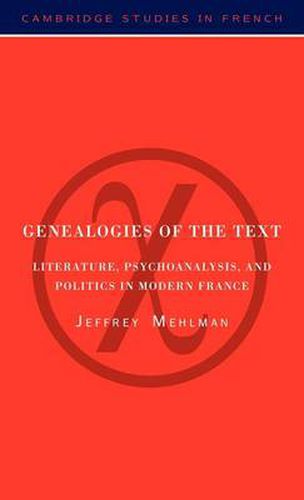Readings Newsletter
Become a Readings Member to make your shopping experience even easier.
Sign in or sign up for free!
You’re not far away from qualifying for FREE standard shipping within Australia
You’ve qualified for FREE standard shipping within Australia
The cart is loading…






In this book, which includes a substantial new introduction and several unpublished essays, Jeffrey Mehlman confronts the politically devastating resonances in the work of several leading French writers. The essays focus on the series of enigmas surrounding the ‘Blanchot affair’ - a scandal provoked by Mehlman’s revelation in 1977 that Maurice Blanchot, one of the tutelary figures of contemporary French thought, had in the 1930s been a prominent fascist journalist. Mehlman takes the issue of Blanchot’s forgotten political essays deep into the most revered - and misunderstood - of his novels, Iphigenia 38. Using this affair as a point of departure, Mehlman sheds new light on the question of the usability of psychoanalysis for literary readings (examining, for example, Baudelaire, Mallarme and Valery); he also investigates the ideological and political connotations of similar literary and theoretical material. The volume as a whole provides a consistently provocative meditation on literature, ethics, and the experience of the French in World War II.
$9.00 standard shipping within Australia
FREE standard shipping within Australia for orders over $100.00
Express & International shipping calculated at checkout
In this book, which includes a substantial new introduction and several unpublished essays, Jeffrey Mehlman confronts the politically devastating resonances in the work of several leading French writers. The essays focus on the series of enigmas surrounding the ‘Blanchot affair’ - a scandal provoked by Mehlman’s revelation in 1977 that Maurice Blanchot, one of the tutelary figures of contemporary French thought, had in the 1930s been a prominent fascist journalist. Mehlman takes the issue of Blanchot’s forgotten political essays deep into the most revered - and misunderstood - of his novels, Iphigenia 38. Using this affair as a point of departure, Mehlman sheds new light on the question of the usability of psychoanalysis for literary readings (examining, for example, Baudelaire, Mallarme and Valery); he also investigates the ideological and political connotations of similar literary and theoretical material. The volume as a whole provides a consistently provocative meditation on literature, ethics, and the experience of the French in World War II.